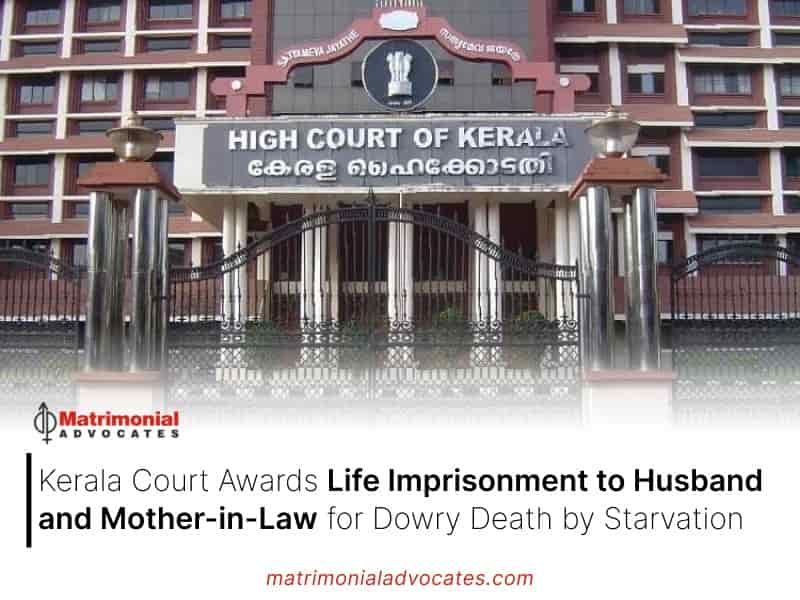
The judge held that the woman died as a result of prolonged starvation inflicted by her husband and mother-in-law, who deliberately withheld food and medicines from the deceased.
A Kerala court has recently sentenced a man and his mother to life imprisonment for the murder and dowry death of his 30-year-old wife, who was deliberately starved by being denied food and essential needs [State of Kerala v. Chanthulal & Ors].
Kollam Additional Sessions Judge S Subash convicted Chanthulal and his mother Geethalali for the brutal killing of Thushara, who was discovered in a severely emaciated condition, weighing merely 21 kilograms at the time of her death in March 2019.
In the judgment pronounced on April 28, the judge concluded that the woman’s death was caused by sustained starvation imposed by her husband and mother-in-law.
The Court observed that the husband’s refusal to provide essential needs, despite being financially capable, constituted a willful and unlawful omission.
“The evidence on record would show that even though A1 had the capacity, means and ability to provide the necessaries of life to his wife, he wilfully and deliberately omitted to discharge the obligation which he owed towards his wife. It is pertinent to note that the deceased was in a helpless state and she was unable to appeal elsewhere for help. Even then A2, who is none other than her mother in law also wilfully and deliberately neglected to provide food or medications to her. Ext.P40, which is the copy of death intimation of Thushara, would show that she was brought dead to the hospital,“ the Court observed.
The Court further held that both the husband and mother-in-law shared a common intention to cause Thushara’s death, and their actions amounted to culpable homicide amounting to murder.
Thushara had married Chanthulal on December 9, 2013.
At the time of the marriage, his family demanded 20 sovereigns of gold and ₹2 lakh as dowry.
As the amount could not be paid immediately, Thushara’s family was compelled to sign an agreement pledging to pay the sum or transfer five cents of land.
When the dowry demand remained unfulfilled, Chanthulal confined Thushara within a high tin-walled compound with a locked gate, effectively isolating her from her family and the outside world.
After her death on March 21, 2019, Thushara’s mother lodged an FIR, raising concerns about the suspicious circumstances surrounding her daughter’s death.
As per the prosecution, Thushara was deliberately deprived of food and medical care, and was frequently locked inside the house whenever the accused stepped out.
The postmortem report revealed that at the time of her death, Thushara weighed merely 21 kilograms and was in a state of extreme dehydration.
The Court concluded that she had been subjected to prolonged starvation, which caused organ failure and ultimately led to her death due to complications arising from acute malnutrition.
The connection between the acts of cruelty and Thushara’s death was established through circumstantial evidence, including witness testimonies from her mother, relatives, and the medical examiner, all of whom confirmed instances of dowry-related harassment and her forced isolation.
The Court determined that the woman had died under unnatural circumstances within seven years of her marriage, with dowry-related harassment being a key factor contributing to her death.
“On a conjoint reading of the evidence of PW1, PW2, PW5, PW6, PW7 and the medical evidence what is discernible that Thushara was subjected to mental and physical cruelty at the matrimonial home. Thushara died due to the consolidation of lungs as a complication of starvation at her matrimonial home. At the time of the death of Thushara, her body weight was 21 kg and her body was emaciated; as per the postmortem findings, the skeletal frame work of the deceased could be easily appreciated due to the state of emaciation and all the internal organs were under weight,“ the Court noted.
Despite the absence of direct eyewitnesses to the act of starvation, the Court held that the prosecution had successfully established beyond reasonable doubt that the accused were responsible for Thushara’s death.
Both accused were convicted under Section 302 of the IPC (murder), Section 304B (dowry death), and Section 344 (wrongful confinement). They were sentenced to life imprisonment for murder, seven years for dowry death, and two years for wrongful confinement, with all sentences to run concurrently.
The proceedings against the father-in-law were terminated due to his death during the course of the trial.





